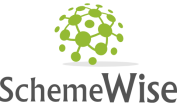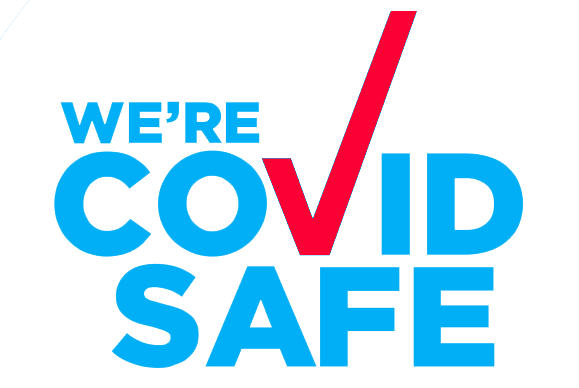
This page contains information on how we're managing COVID-19 in the NSW/ACT-regions,
as well as providing you useful information to stay healthy and safe also.
COVID-19 is the name given to the condition (illness) which arises due to infection from the coronavirus called SAR-Cov2-2019.
As you may know, COVID-19 has since mutated a number of times and 'variants' or 'strains' have emerged which has changed how infections occur and the responses required. There are several omicron strains (now circulating in Australia) which are infective through the air (called aerosol transmission) and with fleeting contact from others only required. Other diseases, like flu (influenza) and similar diseases too, have new strains emerging all the time also.
SchemeWise advises all people who can be, to consider being vaccinated with whichever COVID-19 vaccination they can access. The latest medical advice is that regular booster vaccinations may be required (just like for the flu).
NOTE: Accordingly to Pfizer, it found that a minimum of three jabs is required to ensure protection for Omicron with their vaccine. For this reason, SchemeWise encourages everyone to have a booster as soon as practicable. More generally, all other vaccines have been shown to offer less protection over time as well, so boosters help restore immunity from severe disease (this does not mean you won't get sick... it means you are less likely to end up in hospital on a ventilator). In adiditon to the booster program, every Australian from 5 years and older, can now receive a vaccine too.
UPDATE: As at November 2023, Australia has been declared as entering its 8th COVID wave. The ATAGI (public immunity experts committee) recommendation is that ALL people over 65, Indigenous 50+, and who have either not had COVID in the last 6 months, or had their last booster dose more than 6 months ago, now have a further booster vaccination. This advisory was previously in place only for people with underlying immuno-compromising health issues only. Newer vaccines provide enhanced Omicron variant protection too. Vaccination is safe, free, and strongly enouraged to reduce severity and spread of COVID-19.
aaa
* DID YOU KNOW... We can help customers who need assistance to obtain a vaccination *
SchemeWise officers are ALL fully vaccinated and receive boosters for COVID-19, for your protection and theirs.
We also have a COVIDSafe plan in place providing you optimal services assurance.
There are certain responses such as wearing a face mask and social distancing and limiting contact with others which are essential when local conditions are more risky or there is community transmission happening. These are simple but important ways to stay well and reduce the spread of infectious diseases - like COVID-19.
There are other actions that governments and businesses may seek help with. Options like and compliance to PPE use in high risk settings, check-ins and details recording. These methods also help to limit the spread of infection and/or may help people who have been potentially exposed to isolate and be tested... so they can take timely action to be safe.
At SchemeWise we have the following processes in place:
⇒ Step up/down responses (e.g. call aheads to check you are OK and advice we are too before a service meeting occurs, wearing a face mask always, taking extra precautions like social distancing and ensuring adequate ventilation at a service location, ensuring a clean environment, etc);
⇒ Where possible, change the service mode (e.g. from face-to-face to online teleservice (video) or phone calls where this is practicable);
⇒ For people transitioning from hospital to home - video teleservice or phone calls only;
⇒ For people undertaking an isolation period due illness (themsevles or a resident/family member) - welfare phone calls (or as required) including providing assistance for food and medication delivery if this is needed or connection to a mainstream health or food or other disability service;
⇒ Pandemic Management planning supporting how we manage and respond to pandemics such as COVID-19 but also similar diseases (e.g. flu);
⇒ Our COVID-19 Policy to manage expectations for how our people support customers, work safely, and ongoing servicing where safe to do so;
⇒ Staffing arrangements guiding our planning toward business continuity and service delivery as well as ensuring customers receive service;
⇒ Risk processes guiding service risk planning, mitigation, controls, and preparedness planning, etc;
⇒ Work Health and Safety arrangements guiding our responsibilities to our people and keeping them safe;
⇒ Infection control, vaccination and PPE guidance and use to keep all parties safe.
Our pandemic management policy guides our work and has a set of business continuity principles we utilise. It's important customers also recognise however that SchemeWise is not a public health service and has finite means to support the safety of all parties. While we provide therapy services within a disability, injury and community context, we can only do so where exposure risk is controllable and the risk manageable. At other times, a public health service or a GP service may be a more appropriate place to have complex health services provided.
From the above guidance, we have developed the following flowchart, which describes how our customers and how our people can work safely together. It focuses on how SchemeWise can provide services, in a safe way, and when it cannot. We've had to consider how we interact during service delivery, how you interact with others (family and friends), exposure issues (and potential infection) and also how the impact of COVID-19 might affect our people, affect customers especially if they are in high risk groups, etc. Its no small task! The flowchart below therefore shows how we intend to manage customer or worker exposure/infection, and the timeframes whihc may be needed around safe servicing, if any person was confirmed to be COVID-19 positive. Of course... we also taken an individualised apporach because sometimes actions may be taken on a precuationary basis too, for each parties safety (e.g. pause a service for a lesser period).
(click on arrow icon to view full screen - use ESC key to exit)
aaaaa
HOW TO STAY SAFE IN THE COMMUNITY
Staying safe means to take personal precautions and to keeping doing these precautions. Practice these ways often...
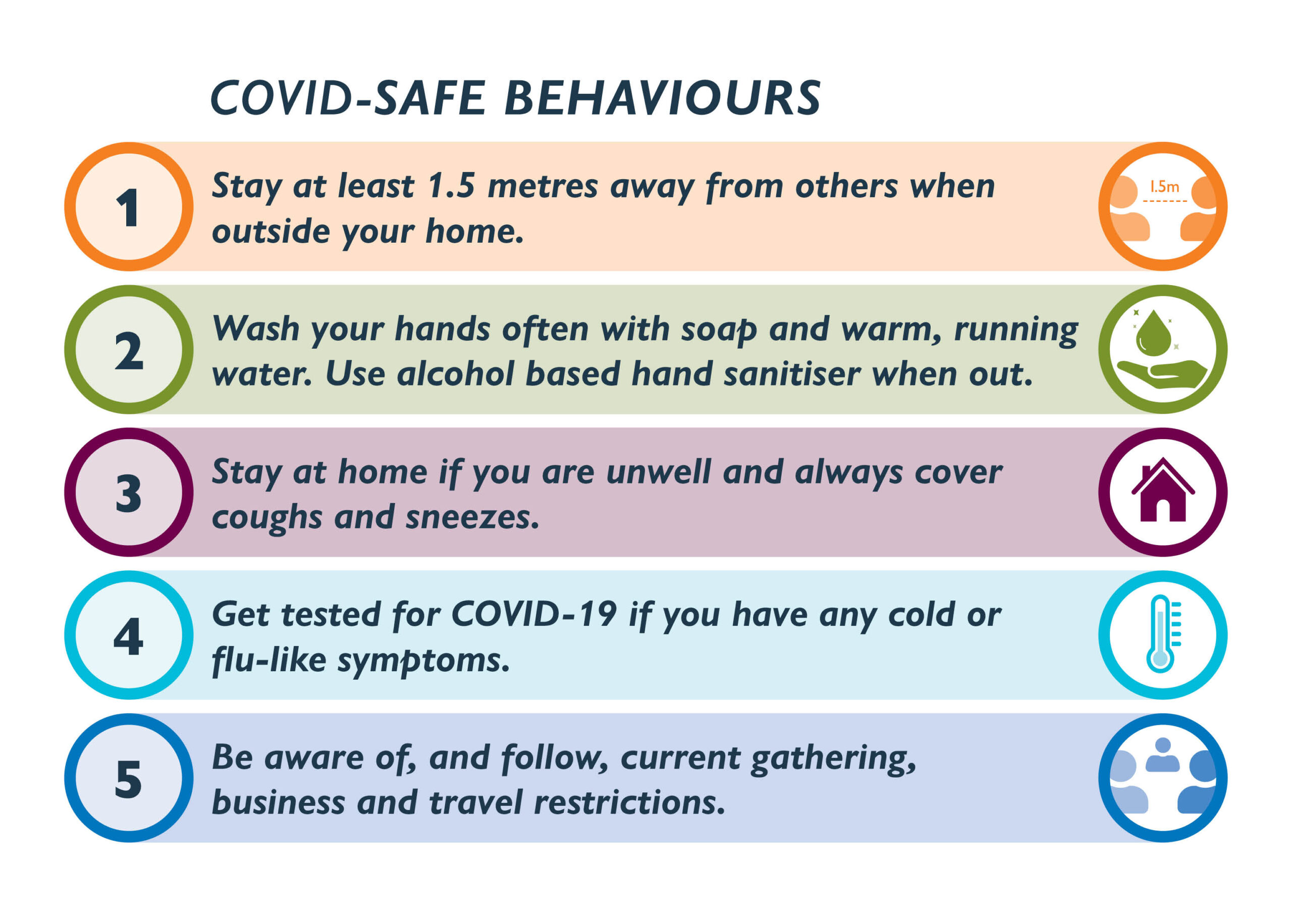
We also want people to know how to be safe. Wearing a face mask is a very easy and important way to remain healthy. At times, public authoristies issue advisoroes to be more cuation and to consider using a mask in any higher risk situation where exposure could be increased. Sometimes, people may be required to wear a face mask to certain places - like at a supermarket, going to the doctors, or even to group places, school or work, when using public transport, in crowded areas or when going to a hospital. The below information shows how to use a face mask effectively to stay safe.
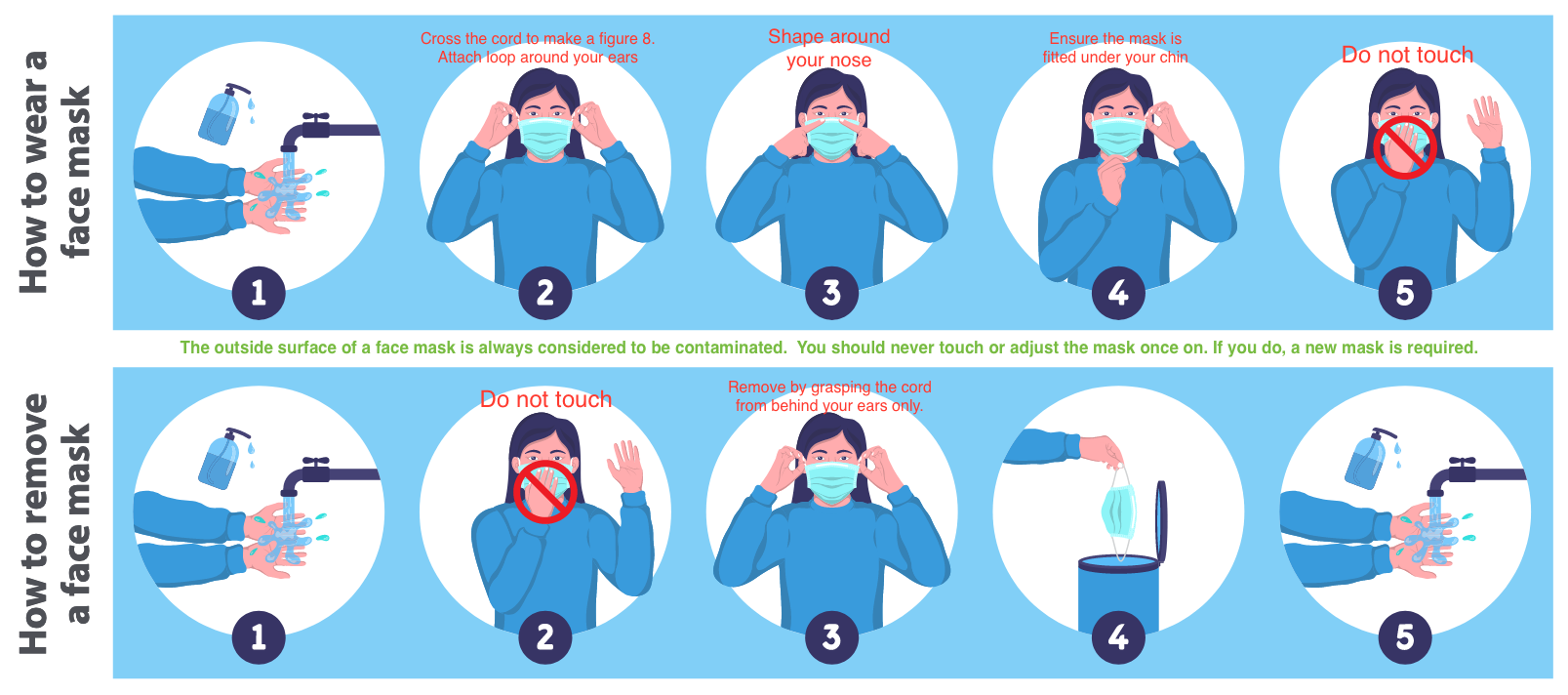 aaa
aaa
VACCINATION
SchemeWise also encourages poeple to get vaccinated, if they can. People with disability and seniors are often at much higher risk for complications from COVID-19. Vaccination is an important way to help reduce the spread of COVID-19 but also to reduce how sick you may get if you are exposed... so you may not have to go to hospital. All SchemeWise people are vaccinationed for your and their safety. Despite being vaccinated, our people continue to pratice their precautions like wearing a mask when they visit, social distancing and good hand hygiene too. For close or personal services further PPE is utilised.
If you'd like to know more about vaccination for you, your family or your disability or aged care workers there is a link at the end of this page to the Commonwealth Dept of Health vaccination information page. There are also new Medicare items which allow your doctor to come to your home and give you a COVID-19 vaccine.
OMICRON UPDATE (ACT/NSW)
WE ARE NOT CHANGING OUR PRECAUTIONS DUE TO THE RELAXING OF SOME PUBLIC HEALTH ORDERS (e.g. quarantine).
Our officers are required to ensure that people living with disability, seniors and people with underlying health problems remain safe. PLEASE ASSIST US IN THIS BY CONTINUING TO PRACTICE PPE AND OTHER PREACAUTIONS AND FOLLOW ANY SERVICE DIRECTIONS REQUESTED. There is every indication that Omicron variants are more infectious than previous variants; for people living with risk factors, possibly just as deadly. Vaccines are less effective against Omicron variants and booster's are necessary to increase protective antibodies (immunity). If you need help to access a vaccine we may be able to assist with arrangements - please ask.
If you'd like to know more about COVID-19 vaccination - click here (Or Easy Read version)
With the omicron variants now circulating locally (ACT, Queanbeyan and broader NSW regions), there are a few changes to be aware of and also different ways we may need your help to deliver our services, to you. This is particularly around aerosol transmission (meaning coronavirus is now spreading through the air simply by people breathing, rather than only when they sneeze or cough). Fleeting contact with infected individuals in now enough to potentially catch COVID-19 from another person, so it is extra important to take standard precautions like washing/sanitising hands frequently for 20 seconds (sing happy birthday twice), wearing a face mask, social distancing at least 1.5m, plus sneezing / coughing into your elbow or a tissue.
Our service officers may also need to use 'additional precautions' due to COVID Omicron variants. This guidance has come from government health departments and we must follow it for all higher risk or close promiximity services. The additional preacautions include:
- ⇒ Ensuring adequate external ventilation at a service location (e.g. open an external window or door and turn off room fans/heaters).
- ⇒ For close proximity services an N95/KN95/P2 mask instead of a surgical mask, mandatory under public health (to be provided for service use by customers).
- ⇒ For confirmed cases (or advised close contacts) and close proximity services, a disposable gown and non-sterile gloves are mandatory (to be provided for service use by customers).
Relevant PPE is to be provided by customers
Disability and aged care customers customers can purchase items through their NDIS /MyAged Care plans at nil personal cost to them (or be reimbursed from the plan).
For personal injury, rehabilitation and private customers, you must also obtain these supplies at your cost. You can do so, by sourcing from reputable suppliers on ebay, or online health equipment suppliers or outlets in your local region. Some supplies (like face shields and masks) may be purchasable in small qunatities at your local chemist. Don't forget to have a ready supply of hand sanitiser available too.
Rapid Antigen Test (RAT) kits, are also a type of PPE - we can take one of these on arrival to assist your safety but we may also ask you or others at your residence to take one too, ahead of providing service if any cocnerns are indicated. Service cannot be provided unless a PCR or RAT test outcome is available and confirmed NEGATIVE. Customers are required to provide RAT kits for service use - these are readily purchasable at local supermarkets or chemists and can be bought online too. Not all RAT kits are equal so visiting the TGA website can help determine the best ones to get. Seniors, pensioners, people with disability and other government card holders currently have access to subsidised (free) RAT kits from their local chemist.
Sometimes a RAT may give a negative result even though a person has symptoms - possible reasons may be that a particular test is not sensitive to the strain, or the person has another repiratory illness like flu/RSV/common cold instead. As these are all transmissible disease, PPE use is still required.
It is also very important you confirm that a RAT is not out-of-date as this may affect the accuracy of the test. If it is obtain a new test and take it again.
PPE stations: Where requested, if we are providing service at your home during a risky time, please set up a PPE station at your front or rear landing area or in a garage or car port for our people's use. this sohuld include all relevant PPE for the service need, plus hand sanitiser and a bagged bin receptical for safe PPE disposal. Used PPE consumables can be disposed in household rubbish.
SERVICE SAFETY
Face-to-face servicing is available so long as no one at a residence has any COVID-19 signs or symptoms (or postive test result). Please assist us so we can continue to help all our customers and people stay safe. Minimising the number of people we see 'in person' remains a control measure we will continue to utilise over 2023-24, which reduces risk and potential spread.
Where necessary, we will shift services to indirect modes like teleservice (online) or phone to ensure we can reduce our movement around the community (and potetnial contact with COVID), OR... if there may be heightened risk to our people, or you. If we can't provde a service due to a safety reason we may pause the service if safe to do so, will help find another service who can assist instead, or refer you to a public health service, as necessary.
We cannot provide a direct serivce to a close contact person, or a person required to isolate - this includes if there is someone at your residence ordered to isolate (any other reason). Please be aware that while NSW/ACT Public Health Orders have been relaxed, most if not all requirements CONTINUE to apply to health, disability and aged care services (regardless of where they occur e.g. hospital, community location or home). This is because poeple living with disability and seniors often have increased vulnerability or other health risk factors and the ongoing Public Health Regulation requirements across these sectors which SchemeWise must adhere to at all times. Thank you for your understanding and support so we can help keep people safe.
NOTES:
1. If you have been directed to, or need a COVID-19 test, we CANNOT provide you a direct service until you show proof of a negative test result (PCR or RAT). You are also required to isolate until you receive a test result or continue to isolate for a required period. If you need help for an essential healthcare need, you should reach out to your local public hospital or public health service. If you are in an emergency situation and unwell, call 000, for assistance. If in crisis, call Lifeline 13 11 14 (24/7 national counselling and crisis service).
2. While RAT kits are designed and generally safe, they are likely to be inaccurate if a person is only recently exposed (i.e. they have a low virus count as the infection is not sufficently established and ar enot shhowing symptoms).IN fact, the only time you sohuld be using a RAT test is if you have been advised of a direct exposure or have any of the symptoms identified below).
3. According to the NSW Chief Health Officer, 75% of people will show a positive result from Omicron infection by 7 days, while the last 25% can take as long as 14 days. A negative test result with a RAT kit at less than 7 days in most cases does not mean you are NOT infected if you are also a close contact. For this reason, we will individually risk screen the circumstances under which a negative RAT was taken, to determine if a service can be safely provided.
To receive an in-home service
⇒ We are now resumed phoning or texting ahead (each morning) for all services to check you and others at your home are well and advise we are too. You must tell us if anyone has cold or COVID-like symptoms (see below), so relevant precautions can be discussed and taken. Please be advised that a short notice cancellation could occur if people have not been honest about their circumstances and/or others in their home do not follow our guidance requirements (as it would be unsafe to provide the service).
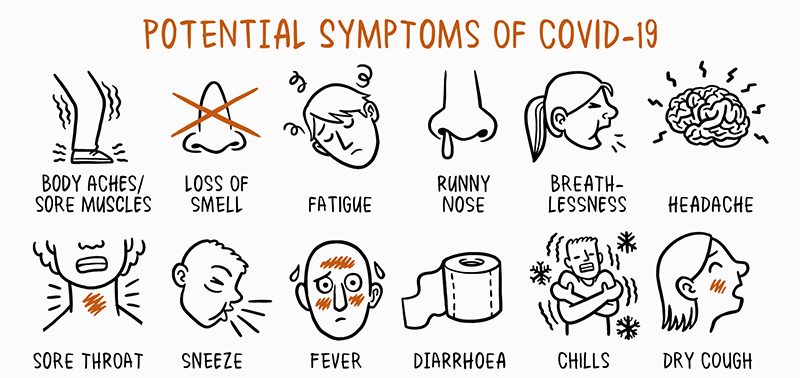
⇒ As a consequence of NEWER variants, unless a person has a medical exemption (which we must sight), we request all household members to wear a face mask while our people are present at any higher risk time. This is to protect all parties, and also, please remember we are moving across customers and wearing a mask helps ensure everyone stays safe. (People with physical disability and/or mental health conditions are not required to provide proof of exemption).
⇒ Adequate ventilation at your home is also a must - this could be as simple as opening a window. Fans, air-conditioners and/or room heaters must be turned off during the service episode only. Any home split-system air conditioners (heat/cool) must also be turned off as these recirculate internal aerosols too. If it is not possible to turn these off then you must provide our people with full PPE to wear (see additional precautions above) BEFORE entry.
⇒ You (or a support person) will need to ensure that the service area has been recently cleaned (like a lounge room or kitchen table and chairs) with detergent solution, disinfectant wipes, or surfaces sprayed with Glen20 or similar product (no more than 2 hours before service commences). This is to reduce virus on surfaces at the service delivery area.
⇒ Our people may require an area for donning/doffing PPE which can be the front / rear porch or entry area, or a garage / carport, before and after a service (if you have set up a COVID-19 station for PPE and hygiene purposes we can use this). The extra time for PPE donning/doffing is charged as part of your service.
aaa
DO YOU NEED HELP WITH COVID PLANNING
SchemeWise officers can help you think about your service and support safety needs with COVID-19. They can assist you to understand the PPE needs for you and your services too. And they can help you make a COVID plan to stay safe, or in case you need to go to hospital (e.g. to ensure emergency services have the information they need to help you). See also the 'preparing for a COVID emergency' section below for further planning resources.
Some people may not wish to make a plan and thats OK - people have a right to live with risk. However we are here to help, so please ask.
Please also be aware, that our people move across the community and other vulnerable populaitons in their work so we do inisist that you please help us by making use of PPE and taking all reasonably advised safety precuations so we can keep providing service to you, and to others.
PLEASE REMEMBER: COVID-19 is not over, and public health measures continue across the DISABILITY, AGED CARE and HEALTH sectors.
aaa
Thank you for your understanding during this time as we balance our assistance to you, and our responsibilities to all parties.
MANAGING STAY-AT-HOME SITUATIONS
Some people may need to isolate if they are advised at risk or may have come into contact with COVID-19 in the community (or a family member has). In other cases, governments may seek to stop community movements by declaring a 'shut down' period (this means everyone has to stay at home). These times may affect people in different ways, so it's important to know what things you can do to look after your wellbeing during these times. the below webpages provided updated advise on what to do if you think (or are advised) of a possible COVID-19 exposure (these weblinks are constantly updated by the relevant jurisdictions).
NSW - Guidance for people exposed to COVID-19 ACT - Guidance for poeple exposed to COVID-19
FURTHER UPDATED GUIDANCE: the new isolation and testing guide above is in place from January 2022. This retains the close contact definition and focuses it toward family/household members generally. From March 2022 there is no longer a casual contact definition and close contacts whom test negative may not need to self-isolate. The use of repeated RAT kits is suggested for managing exposure risk and taking personal responsibility and relevant actions - these only work if you have symptoms (however mild). If you remain unsure of your exposure risk consider obtaining a PCR test (this is the only test which can provide a definitive result).
Here are some ideas to stay sane while at home...
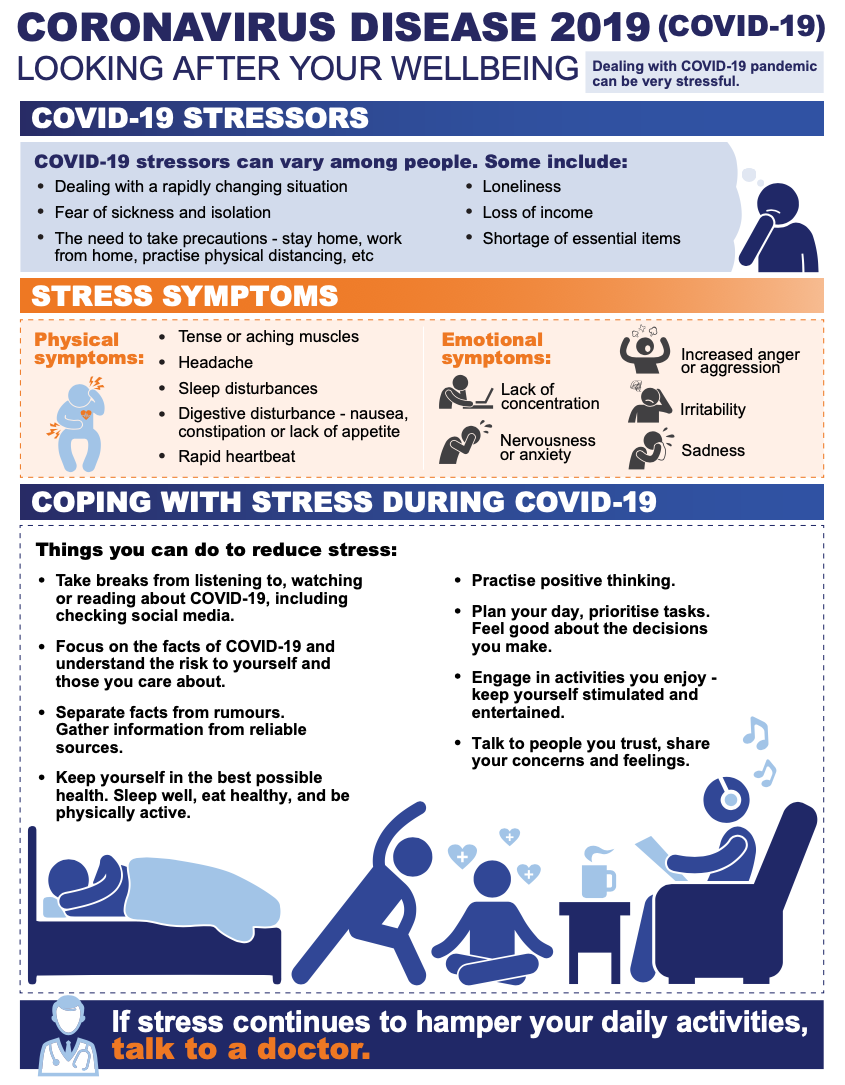
aaa
RESOURCES FOR YOU
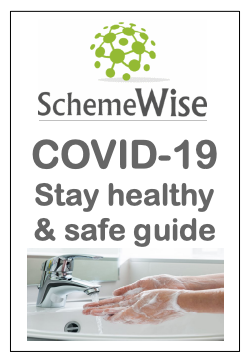
SchemeWise 'COVID-19 - How to Stay Healthy and Safe Guide' can help people living with disability. (Thanks to public sources whom have assisted development) Our guide is targeted toward people living with intellectual disability, cognitive impairment (any reason), children and people living with stroke or dementia. SchemeWise coordinators, nurses and counsellors can help with staying healthy and well if you live in the ACT region, where NDIS participants need additional support. Our coordinators can also help with making arrangments for COVID-19 vaccination if you are having difficulty accessing this option (just ask and we can take you through the options).
In clicking the button below and downloading this resource You agree to the folllowing terms and conditions:
• Not to further distribute the 'SchemeWise COVID-19 Staying Healthy and Safe Guide' or link to it in any way; and, You agree that the resource is for Your personal use only and will not be used for any other commercial or marketing purpose (including by any related third party/entity to You); and, You are made aware that SchemeWise records details about downloads including but not limited to the downloader's unique IP address, time and date of download, browser details, etc, and that You agree to SchemeWise retaining such records on a database for its assurance and other purposes.
Preparing for a COVID-19 emergency or crisis happening to you
To be prepared... you may like to think about these things:
1. What additional help you may need if you become unwell?
2. If you live alone, who needs to know that you may have been potentially exposed to COVID-19 or have received a positive test (so they can check and make sure you're OK?)
3. For isolation/unwell periods what medications, food, PPE or other supplies will you need and can these be delivered to you?
4. Have you contacted your essential services and suports to see how they can continue to help you? Or what other arrangements may be necessary? (if you have a support coordiantor or case manager you sohuld let them know in particualr so they can help with these arrangements).
5. What will you do if you become more unwell? (e.g. do you have your doctor's number or access to a phone to ring emergency services on 000 or 112)?
6. If you have any pets or animals have you thought about how to, or who will care, for them? Do you have sufficent pet food?
7. If you work have you let your employer know? And if you rent, have you informed the lessor or real estate agent? (Its illegal to sack a worker of evict a person unwell with COVID-19).
You can access a person-centred COVID-19 preparedness plan to help think about your arrangements - click here (Easy Read Version)
Other planning guidance
NSW - Know how to self-isolate guide Essential Items Checklist STOP - Door sign NSW - who to call resource ACT - COVID-19 info page
aaa
We've also collated a range of helpful materials including Easy English & Easy Read materials to help people understand more about COVID-19; and what they can do. These materials can assist people across disability, aged care, rehabilitation & health. Easy read materials can particularly help people living with any time of cognitive condition/impairment (incl. ID, DD, ABI or dementia).
NSW Govt - Cleaning surfaces at home (we may need you to do this if SchemeWise people must come to your home)
NSW Govt - Information about coronavirus testing (BEFORE January 2022 only)
Commowealth Dept of Health - COVID-19 vaccine information for people with disability
Commonwealth Dept of Health 2023 - How to get the COVID-19 vaccine & Vaccine things to know (Easy Read)
Commonwealth Dept of Health 2023 - Vaccines available in Australia (PDF poster)
Commonwelath Dept of Health 2023 - COVID-19 boosters fact sheet (Easy Read)
Commonwealth Dept of Health 2023 - COVID-19 and ventilation (Easy Read)
Commonwealth Dept of Health 2023 - COVID-19 update for Indigenous communities (Newsletter)
Beyond Blue - COVID-19 mental health support (page)
LifeLine - COVID-19 mental health and wellbeing support (page)
Aged Care Commission - COVID Consumer Resources (page)
Aged Care Commission - How to stay safe from COVID guide
Advocacy for Inlcusion - Staying safe with COVID-19
Health Safety & Quality Commission - COVID and face masks factsheet
Commonwealth Dept of Health 2022 - How to wear a mask + important considerations (general public video)
ACT Govt - Information about when to get tested AND testing sites (from Janaury 2022 there are changes to various sites)
Commonwleath Dept of Health 2023 - Rapid Antigen Tests (RAT) (PDF fact sheet)
NSW Govt - Keeping your family and friends safe
ACT Govt - Understand how to prevent the spread of germs (hygiene practices)
ACT Govt - Information for People with disability (page)
HealthDirect Advice Service - People with disability and COVID-19 information page
ACT Govt - How to stop the spread of COVID-19 (easy read version at bottom of page)
Commonwelath Dept of Health 2022 - Routine environmental cleaning & disinfection in the community (PDF)
Australian Safety Commission - Safe care for people living with cognitive impairment
NSW Govt - Guide to self-isolation and testing
NSW iCare - COVID-19 factsheets (page)
NSW iCare - iCare customer (cross sectoral) COVID-19 resources (page)
NDIS - COVID-19 measures for participants (+ information around plan reviews and budget flexibility for PPE purchasing)
NDIS Commission - Coronavirus information (Easy Read)
NDIS Commission - What participants can expect from service providers (Easy Read) Note: providers can only do these things if they are safe too.
aaa
NEED MORE HELP? Call the National Coronavirus Helpline on 1800 020 080
aaa
aaa
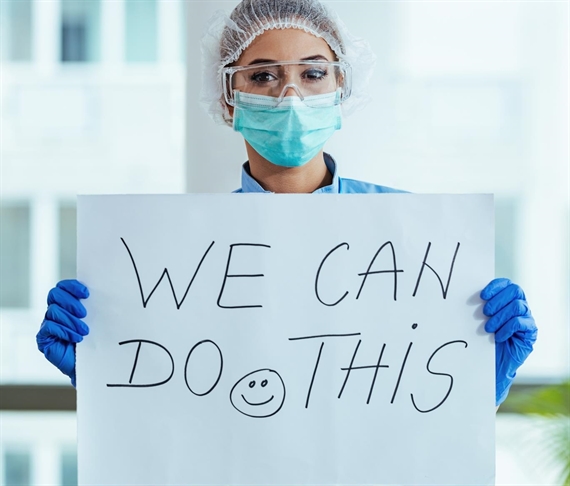
aaa
Please stay safe...
Don't forget to tell your family or support services if you or someone you live with, is unwell.
aaa
aaa
